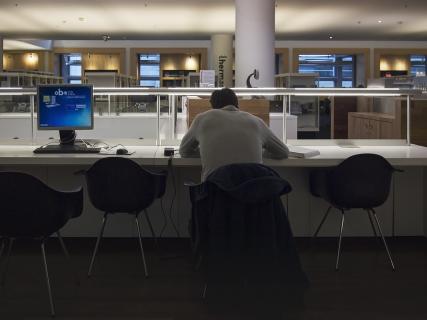
By Corey Dahl
For better or worse, I have a hard time believing anyone who claims to be an expert or to have all the answers—or even any answers. Like, I doubt the official line as well as the various conspiracy theories about the official line. Like, I would subscribe to Skeptic magazine, but I question the value.
At the same time—maybe because that distrust extends to clocks, or because people are complex, or because I am neurotic—I’m also someone who indulges in a lot of magical thinking when it comes to time and how much a person can actually fit into a day. Occasionally, I wind up stress-crying in front of my laptop at midnight, simultaneously worried that my breakdown is putting me even further behind schedule and that I’m going to short out my computer with my tears.
So you understand where I’m coming from when I say that going into Schedule Hacks: Writers With Jobs Talk About Getting Things Done—the first brown bag business panel at Lit Fest this week—I was certain it was a waste of my time but also secretly hopeful that is would solve all of my scheduling problems. It wasn’t and it didn’t, of course, and that was somehow better.
The panelists—Wendy Fox, Nick Arvin, Alexander Lumans, and Teow Lim Goh—spoke honestly about the challenges of writing while holding down a job and managing their own life business. Basically, they all agreed, it’s hard for everyone—but it’s not impossible. Some of my favorite takeaways:
- Fox, on escaping distracting spouses and kids: “It’s important that you have somewhere you can go to write. If you need to get a lock, get a lock.”
- Arvin had spent the previous weekend at scout camp with his son, writing after the kids had gone to sleep and while everyone else was at breakfast in the morning. “Just fit it in wherever you can,” he said. “If you only have 15 minutes, just do 15 minutes.” (From now on, Nick Arvin writing by flashlight in what I can only assume was a pup tent is the inspirational image I will summon whenever I’m too tired to write.)
- No one on the panel felt like they were writing as much as they’d like to, but that’s okay. “If you just wrote 150 words every day, you’d have a novel at the end of a year,” Fox said. “It might be a little disjointed, but you’d have it.”
- Also, writing isn’t everything. Lumans is an advocate for staring off into space. “Even when you’re not writing, your brain is still working,” Goh said.
- And finally, Goh on the importance of writing, even when you don’t get paid to do it: “We do a lot of work that doesn’t pay—like raising children—but that doesn’t mean it’s not important or doesn’t have an impact. I think of literary work as cultural care work.”
Good things to keep in mind before the next laptop cry sesh. And don't forget: we’re holding brown bag business panels throughout Lit Fest! Check out the catalog for details.
Corey Dahl is the communications coordinator at Lighthouse Writers Workshop. One day, she will finish the short story collection she’s working on. But not today.

